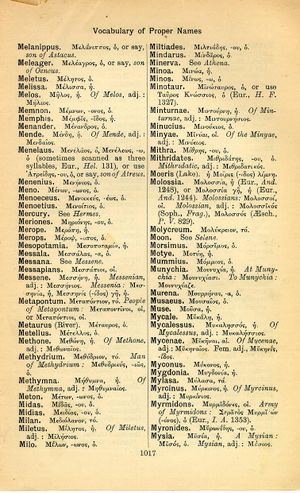Mithridates: Difference between revisions
(D_6) |
(Gf-D_6) |
||
| Line 1: | Line 1: | ||
{{WoodhouseENELnames | {{WoodhouseENELnames | ||
|Text=[[File:woodhouse_1017.jpg|thumb|link= | |Text=[[File:woodhouse_1017.jpg|thumb | ||
|link={{filepath:woodhouse_1017.jpg}}]]Μιθριδάτης, -ου, ὁ. | |||
<b class="b2">Mithridatic</b>, adj.: Μιθριδατικός. | <b class="b2">Mithridatic</b>, adj.: Μιθριδατικός. | ||
| Line 8: | Line 9: | ||
}} | }} | ||
{{Gaffiot | {{Gaffiot | ||
|gf=<b>Mĭthrĭdātēs</b>,⁹ is, m. (Μιθριδάτης), Mithridate [roi du Pont] : Cic. Ac. 2, 3 ; Mur. 32 || autres du même nom : Cic. Fl. 41 ; Tac. Ann. 11, 8 || <b>-tēus</b> Manil. 5, 515, <b>-tĭcus</b> Cic. Fl. 41 ; Pomp. 7, <b>-tīus</b>, a, um, Plin. 25, 62, de Mithridate. | |gf=<b>Mĭthrĭdātēs</b>,⁹ is, m. (Μιθριδάτης), Mithridate [roi du Pont] : Cic. Ac. 2, 3 ; Mur. 32 || autres du même nom : Cic. Fl. 41 ; Tac. Ann. 11, 8 || <b>-tēus</b> Manil. 5, 515, <b>-tĭcus</b> Cic. Fl. 41 ; Pomp. 7, <b>-tīus</b>, a, um, Plin. 25, 62, de Mithridate.||autres du même nom : Cic. Fl. 41 ; Tac. Ann. 11, 8||<b>-tēus</b> Manil. 5, 515, <b>-tĭcus</b> Cic. Fl. 41 ; Pomp. 7, <b>-tīus</b>, a, um, Plin. 25, 62, de Mithridate. | ||
}} | }} | ||
Revision as of 07:24, 14 August 2017
English > Greek (Woodhouse)
Μιθριδάτης, -ου, ὁ.
Mithridatic, adj.: Μιθριδατικός.
Latin > English (Lewis & Short)
Mĭthrĭdātes: is (dat. -dati, Gell. 15, 1, 6), m., = Μιθριδάτης.
I Mithridates the Great, king of Pontus, who waged war with the Romans, was at last conquered by Pompey, and stabbed himself, Cic. Ac. 2, 1, 3; id. Mur. 15, 32 sq.; id. Agr. 2, 19, 52; id. Fl. 24, 57; 25, 59 sq.; Plin. 25, 2, 3, § 5; Val. Max. 1, 8 ext. 13; 3, 7, 8. He eārly fortified himself against poison by taking antidotes; hence, profecit poto Mithridates saepe veneno, Toxica ne possent saeva nocere sibi, Mart. 5, 76 (cf.: antidotum Mithridatium, Plin. 29, 1, 8, § 24); Cels. 5, 23, 3; Juv. 14, 252.—
II A witness against Flaccus, Cic. Fl. 17, 41.—
III A king of Pergamos, a friend of Cæsar, Auct. B. Alex. 26.—
Surnamed Euergetes, an ally of the Romans against Carthage, Just. 37.—
The fifth king of the Parthians, the most powerful of all the Parthian kings, Just. 41.—
The eighth king of the Parthians, Just. 42, 2.—
A king of Armenia, Tac. A. 11, 8 sq.; 12, 45 sq.—Hence,
A Mĭthrĭ-dātēus, a, um, adj. (Mĭthradātīum, Plin. 29, 1, 8, § 24; Scrib. 194), of or belonging to a Mithridates (poet.): nomina, Ov. M. 15, 755: vultus, Manil. 5, 515: herba, Plin. 25, 6, 26, § 62: antidotus celebratissima quae Mithridatios vocatur, Gell. 17, 16, 6.—Subst.: Mĭthrĭdātīum, ii, n., an antidote, Cael. Aur. Tard. 4, 1, 12.—
B Mĭ-thrĭdātĭcus, a, um, adj., of or belonging to Mithridates, Mithridatic (class.): bellum, Cic. Imp. Pomp. 3, 7 (v. Mithridates, I.): victoria, over Mithridates, Plin. 15, 25, 30, § 102: crimen, of the witness Mithridates, Cic. Fl. 17, 41.
Latin > French (Gaffiot 2016)
Mĭthrĭdātēs,⁹ is, m. (Μιθριδάτης), Mithridate [roi du Pont] : Cic. Ac. 2, 3 ; Mur. 32 || autres du même nom : Cic. Fl. 41 ; Tac. Ann. 11, 8 || -tēus Manil. 5, 515, -tĭcus Cic. Fl. 41 ; Pomp. 7, -tīus, a, um, Plin. 25, 62, de Mithridate.

